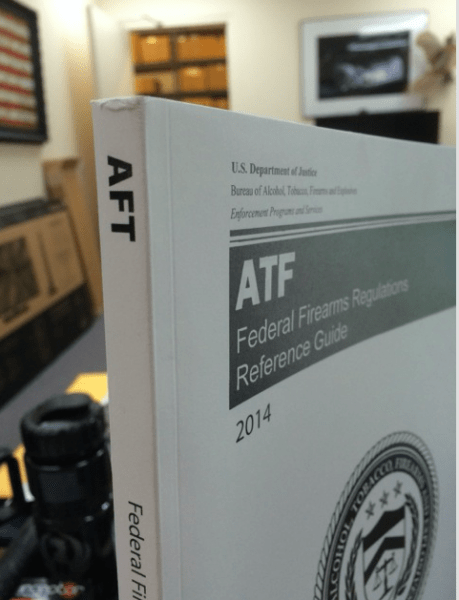By David Codrea

USA – -(Ammoland.com)- Uniform, consistent and timely treatment of Federal Firearms Licensees subject to administrative hearings has yet to be demonstrated, Christopher Chiafullo, National Coordinating Counsel for legal and ATF compliance firm FFLGuard tells AmmoLand. He was referring to a rule change effective July 22 that was posted Monday in the Federal Register that includes observations he submitted four years prior during the rulemaking comment period.
“The Department of Justice is amending the regulations of the Bureau of Alcohol, Tobacco, Firearms, and Explosives (ATF) regarding administrative hearings held as part of firearms license proceedings,” the final rule summary explained. “This rule clarifies that persons requesting a hearing will be afforded the opportunity to submit facts and arguments for review and consideration during the hearing, and may make offers of settlement before or after the hearing.”
“I wrote a letter on May 3, 2012,” Chiafullo countered. “At that time, it was clear that the ATF hearing process wasn’t informal, they didn’t review offers of settlement (they hid behind ‘policies’ that I know through ATF retirees don’t exist) to forgo the need to litigate, and they were very vague on how their hearing process worked. Basically, the hearing process was whatever the ATF lawyer said it was.
“And I let it fly in my letter about the one-sided nature of the proceedings, how it was ambush tactics even when the licensee was represented by counsel (no exchange of discovery, an ATF employee serves as the hearing officer, objections are lodged in the ‘informal proceeding like it’s an episode of ‘Law & Order,’ etc.),” Chiafullo continued. “It took them four years to make a final rule. FOUR YEARS.”
He acknowledged the decision to remove the word “informal” from the regulatory text regarding hearings was a quiet victory. “They would lure people into coming to the hearing and saying ‘Hey, we’re all friends here,’ when that was far from the case.
“Funny thing is, it says the procedures are ‘implemented’ but they fail to mention that the procedures are not ‘monitored to insure they are followed,’” Chiafullo further explained. He also challenged ATF’s contention that its internal communication among ATF personnel is an “integral part of the process.”
“If you ask any SAC [Special Agent in Charge] of any ATF field office if they’ve attended any revocation hearing ever, in their lifetime, the answer will be NO,” he charged. “To add insult to injury, that same response would be had if you asked many DIO’s [Director of Industry Operations], too… they very folks who hold the licensees fate in their hands.”
“Probably most important, however, is the clarification — specifically to ATF personnel in particular — that FFLs can now make Offers of Settlement prior to a hearing, which — no matter what they say — was rarely permitted,” Chiafullo observed. “Because they knew — and still know — that the way the system is set up, ATF does NOT need to compromise. My argument was that this hard-line position just fostered ill-will towards the system.
“In the end, these are probably just minor victories. So I got them to get rid of ‘informal’ so no FFL walks into a firestorm without a lawyer (like they used to at times). That’s a plus. And maybe there’s a sliver of a chance that FFLs can negotiate their way out of a revocation (that’s to be determined). But in any event, it’s clear that FFLGuard has spoken for those who needed to be spoken for — and rule makers listened.
“While these changes have been made at our urging, they may only be symbolic ones at best,” he acknowledged. “To wit, by them saying that ‘ATF procedures are implemented to provide fairness and uniformity to all participants…’ just skirts over the fact that their ‘system’ is never tested to prove that ‘implementation’ leads to ‘execution.’ There’s no ombudsman, no peer review, to quality controls, nothing.
“Maybe, just maybe, our next big push should be something like, ‘Yeah? Prove it. For example: How many cases did you settle before a hearing? How many after?’” Chiafullo concluded. “I’d be surprised if there were very many.”
Related Links:

About David Codrea:
David Codrea is the winner of multiple journalist awards for investigating / defending the RKBA and a long-time gun rights advocate who defiantly challenges the folly of citizen disarmament.
In addition to being a field editor/columnist at GUNS Magazine and associate editor for Oath Keepers, he blogs at “The War on Guns: Notes from the Resistance,” and posts on Twitter: @dcodrea and Facebook.
